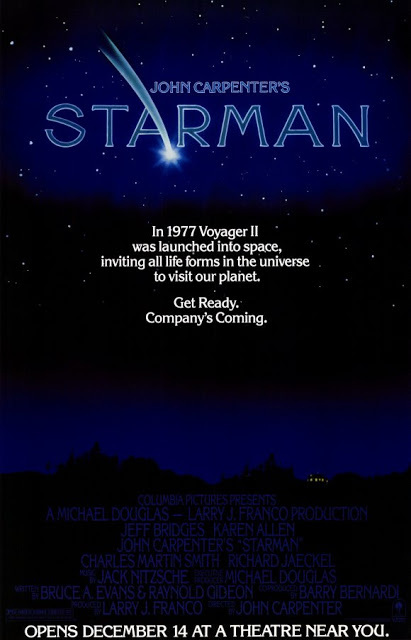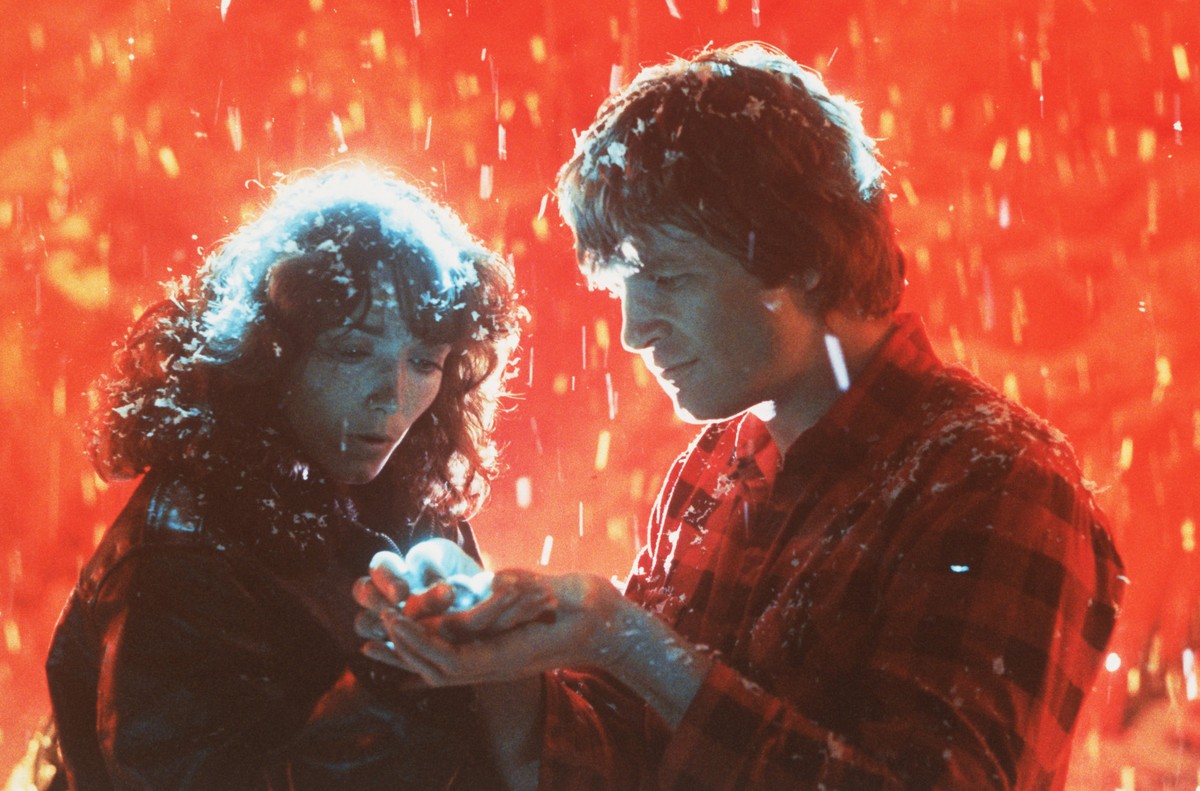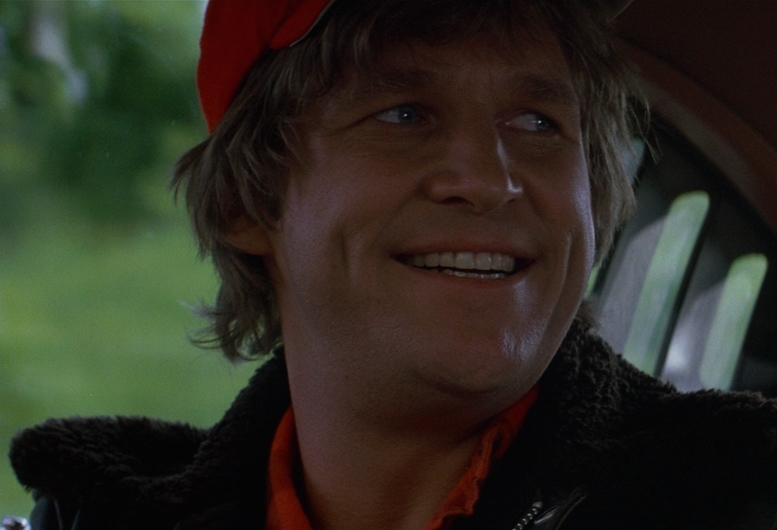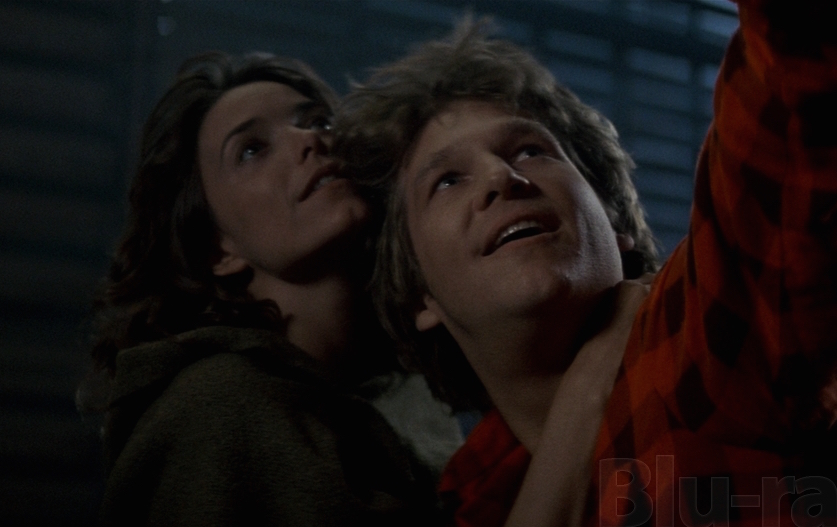The Complete Carpenter: Starman (1984)
 It’s taken me exactly a year to go from Dark Star to Starman in my survey of John Carpenter’s career. At this rate, I’ll be at Escape From L.A. by this time in 2018. The timing works out on this one, however. There’s no “winter holiday” Carpenter movie — no, The Thing doesn’t count, that’s a “winter” movie — but Starman is as cheerful and uplifting a science-fiction tale as Carpenter has ever turned out, so it feels right for December.
It’s taken me exactly a year to go from Dark Star to Starman in my survey of John Carpenter’s career. At this rate, I’ll be at Escape From L.A. by this time in 2018. The timing works out on this one, however. There’s no “winter holiday” Carpenter movie — no, The Thing doesn’t count, that’s a “winter” movie — but Starman is as cheerful and uplifting a science-fiction tale as Carpenter has ever turned out, so it feels right for December.
Starman has quite the long history behind it. The script was in development at Columbia back in 1980 and went through a round-robin of writers. Columbia had the opportunity to do the Spielberg project that would eventually turn into E.T., but turned it down in favor of Starman — a decision the studio would come to regret when E.T. became the highest-grossing movie in history during the Summer of 1982 (when it squashed a certain other alien visitor movie).
The mega success of E.T. caused director John Badham to abandon Starman because he thought it was too similar to Spielberg’s movie. (Badham went on to direct WarGames, so that worked out.) Many other directors were on the film at one time or another — Adrian Lynne, Mark Rydell, Tony Scott, Peter Hyams — but John Carpenter had the pitch that stood out: film it as a love story/road movie in the classic Hollywood vein. Like It Happened One Night, but with an alien. Carpenter wanted to show he had the directing chops to tackle a different type of material. He was also still wounded over the poor reception of The Thing and wanted to deliver a hit for a big studio.
And thus we have a John Carpenter film for the whole family! Which is odd enough on its own.
The Story
Advanced extraterrestrials discover space probe Voyager II and choose to answer humanity’s invitation to “come and see us sometime,” as inscribed on the probe’s audio-visual disc. An alien observation ship heads to Earth, but the U.S. Air Force knocks it from its planned course so it crashes in rural Wisconsin. The disembodied alien aboard takes on the human shape of Scott Hayden (Jeff Bridges), the recently deceased husband of lonely Jenny Hayden (Karen Allen), by using DNA from a lock of Scott’s hair.
Jenny’s reaction to the physical resurrection of her husband with an extraterrestrial’s mind is… complex. She agrees to drive Starman-Scott to Arizona for a rendezvous with a ship from his homeworld. At first she acts out of fear, but later because she’s genuinely falling in love with the being in Scott’s shape — and she knows his body will die unless he makes the rendezvous. Their cross-country trip must stay ahead of pursuit by the police, a curious SETI scientist (Charles Martin Smith), and an aggressive National Security Agency director (Richard Jaeckel) who isn’t interested in giving the alien the “friendly reception” promised on Voyager 2’s golden disc.
The Positives
Starman is a sweet, lyrical movie that has aged beautifully. It’s Carpenter’s most humanist film, the opposite of the invasion paranoia and frigid horror of The Thing. But Starman isn’t Carpenter attempting to do a karaoke E.T. or imitate Spielberg, even considering the background of the project. No one else could’ve made Starman the way Carpenter did. E.T. is a science-fiction fable about childhood. Starman is a science-fiction fable about adulthood, realized as a road movie. It’s also a beautiful and complex romance about love rediscovered and hope overcoming morbidity and the human tendency to cynicism. Yes, overcoming cynicism in a John Carpenter film!
 In short, this is probably the only John Carpenter film you can show to your Great Aunt Betty. Or to any other relatives who just don’t get out to movies that often. It’s a four-quadrant film — the only one in the director’s career.
In short, this is probably the only John Carpenter film you can show to your Great Aunt Betty. Or to any other relatives who just don’t get out to movies that often. It’s a four-quadrant film — the only one in the director’s career.
It’s astonishing/aggravating how the 1980s shrugged off the brilliance of Jeff Bridges. It wasn’t until the late 1990s that the entertainment world stopped taking him for granted as merely a handsome actor who had an almost proverbial trouble landing roles in hit movies. Starman is a perfect case of this: although he was nominated for an Academy Award for Best Actor that year, Bridges not only didn’t win, he didn’t experience a major career boost from the nomination. Starman was only a moderate success in 1984, which didn’t help, and people seem to have forgotten Bridges was even nominated for the movie.
Bridges’s Best Actor nomination is the only time any Carpenter film got an Oscar nod. (“What, The Thing wasn’t nominated for special effects?” you’re shouting. Nope, it wasn’t. Don’t shoot the messenger.) Bridges lost to F. Murray Abraham for Amadeus. I can’t complain much about this because Jeff Bridges eventually won an Oscar for Crazy Heart in 2009, Abraham was superb in Amadeus, and Bridges has never been anything but thankful for the career he’s had. (“I couldn’t of dreamed it being any cooler than it is,” he said in a 2009 interview.) But given all that, if I were an Academy voter in 1984, I’d definitely cast my vote for Jeff Bridges. Because he’s just amazing in Starman.
Bridges as Starman-Scott is immediately impressive for the unusual physicality the actor invests in the part. Viewers are continually reminded through even the smallest gestures (oh, that nutty smile!) that this is an alien creature trying to figure out the most basic workings of the human body and human communication. Just watching Starman attempt to navigate eating Dutch apple pie feels like a full acting course. There’s also tons of great humor from the character quirks, with gags that Terminator 2: Judgment Day would later recycle as Starman-Scott fumbles with colloquialisms and gestures like “Take it easy,” and “Up yours.” My favorite of these comedy bits is when Starman-Scott nearly gets him and Jenny killed on a railroad track because he learned the wrong lesson about driving from watching her: “Red light stop, green light go, yellow light go very fast.”
But what Bridges achieves with the role is bigger than odd tics and a physical sense of the alien. He shows Starman-Scott evolve over a few days from an entity that terrifies Jenny into a person she loves deeply, and not only because he resembles her deceased husband. Starman is an alien moving toward human — but also toward something better than human and better than his species, as he indicates his and Jenny’s son will be. His wordless resurrection of Jenny inside the trailer is a powerhouse moment for Bridges where he shows the key point of alien and human merging. (He never tells Jenny that he brought her back from death, a subtle but wonderful addition to the character.)
It takes two to make a romance story work, of course. Thankfully, Karen Allen delivers her career-best performance as Jenny Hayden. (Sorry, Raiders of the Lost Ark.) Starman-Scott may be the flashiest part, but Jenny is the main character who goes through the change from a woman burnt-out early in life by the loss of a loved one to a woman reborn with hope for the future. The role is an incredibly challenging one, putting the strain of a constant tug-of-war of emotions on Allen as she reacts to the bizarre actions and potential danger from an alien wearing the form of the recently deceased love of her life. That’s plenty for an actor to unpack in each scene, and Allen goes on an incredible emotional road trip along with the physical one. Trying to explain the meaning of love to Starman-Scott in the diner, right as she’s making another plan to escape from him, is one of the tear-jerking highlights. But it’s the scene aboard the train, where Starman-Scott tells her she will have his baby, that contains Allen’s finest moments. It’s also the best scene in the film, lovingly crafted in a way I’d wager most people in Hollywood would never have expected from John Carpenter.
Although still missing photographer Dean Cundey (Donald M. Morgan repeats from Christine), Carpenter lenses some amazing outdoor sequences using the open spaces of Middle America as a canvas. It’s the most visually wide-open film he ever shot. I’m used to complimenting Carpenter and his cinematographers for doing impressive work with the widescreen format in enclosed and dark spaces. Here’s the opposite: Carpenter having the opportunity to shoot a movie like a John Ford epic Western. He even gets to use Monument Valley!
Starman is my pick for the best score to a John Carpenter film not composed or co-composed by John Carpenter. Producer Michael Douglas convinced Carpenter to let Jack Nitzsche score the film, based on Douglas’s previous work with Nitzsche on One Flew Over the Cuckoo’s Nest. Nitzsche’s all-electronic score has some striking similarities to Carpenter’s own work (I think he paid close attention to the director’s musical style) but it develops enough of a separate identity. The main theme, a soaring love piece, is an exemplar of how mid-1980s composers were discovering ways to create vast electronic soundscapes. (See also: Vangelis.)
The only Carpenter Acting Company regular to pop up is Buck Flower, who plays a short-order cook who gives Starman-Scott a ride after the alien feels he’s putting Jenny in too much danger. It’s one of the funniest scenes, as the cook finds its surprisingly easy to chat with Starman-Scott’s odd handling of conversations:
Cook: What’s your line?
Starman-Scott: Line?
Cook: Work. Whaddya do when you’re not hitching rides?
Starman-Scott: Oh, I make maps.
Cook: Make any money?
Starman-Scott: [pause] I make maps.
Cook: Well, you don’t get rich cookin’ either!
At one hour and fifty-five minutes, Starman is John Carpenter’s longest movie. Think about that: nineteen movies on his resumé and none even reached the two-hour mark. That’s incredible, and it says plenty about what an efficient filmmaker and tight storyteller Carpenter is.
The Negatives
I don’t have much to say against Starman. As a gentle science-fiction romance, it’s nearly perfect. Yet … it’s never my first choice when I’m looking to rewatch a John Carpenter film. There’s so much to love about it, but it doesn’t engage me on the same level that even some ostensibly lesser entries in the Carpenter filmography do.
 As I talked about above, this isn’t a sell-out movie or Carpenter trying to imitate a recent hit. This is no work-for-hire paycheck gig like Memoirs of an Invisible Man. But it feels like something Carpenter needed to do at least once so he could get back to the suspense, cynicism, and violent weirdness that are his specialty; the films of his that are endlessly rewatchable. Starman is an interesting detour for Carpenter, as well as a good film to share with non-fans and family members who don’t want to watch gang members murder a little girl, an “action adventure comedy Kung-Fu ghost story monster movie,” or a satirical/political allegory about alien invaders that also contains a prolonged wrestling scene. Just writing those descriptions explains a lot about why I love John Carpenter’s movies — and why I feel a touch removed from Starman.
As I talked about above, this isn’t a sell-out movie or Carpenter trying to imitate a recent hit. This is no work-for-hire paycheck gig like Memoirs of an Invisible Man. But it feels like something Carpenter needed to do at least once so he could get back to the suspense, cynicism, and violent weirdness that are his specialty; the films of his that are endlessly rewatchable. Starman is an interesting detour for Carpenter, as well as a good film to share with non-fans and family members who don’t want to watch gang members murder a little girl, an “action adventure comedy Kung-Fu ghost story monster movie,” or a satirical/political allegory about alien invaders that also contains a prolonged wrestling scene. Just writing those descriptions explains a lot about why I love John Carpenter’s movies — and why I feel a touch removed from Starman.
One actual criticism I have is that the government/science sections of the story with scientist Mark Shermin and military blowhard George Fox are less developed than the road trip romance sections. The seamless split between these similar halves of the narrative that Spielberg achieved in Close Encounters of the Third Kind with Roy Neary’s collapsing family on one side and Lacombe’s quest on the other doesn’t occur here. The movie loses a bit of its momentum whenever it shifts away from its central couple.
Charles Martin Smith gives Mark Shermin personality, but there’s not much to the character on the page and his impact on events is minimal. The trimming down of the military, political, and SF aspects of the story to center more on the romance only really inflict damage to the movie in this case: it seems as if Shermin should have a larger role and much more to say about who and what the alien visitor is. His only encounter with Starman-Scott is a short one; I would’ve enjoyed a few additional minutes of exchange between them to learn more about Starman’s view of humanity and what drives Shermin.
The Pessimistic Carpenter Ending
Not applicable! This is as optimistic as Carpenter films come, leaving Jenny Hayden on Earth with her life renewed and the gift of a child from both her husband and the Starman — a child who shall become a teacher. You won’t find as optimistic a quote in the Carpenter canon as Starman’s observation on humanity: “Shall I tell you what I find beautiful about you? You are at your very best when things are worst.”
Next: Big Trouble in Little China
Ryan Harvey is one of the original bloggers for Black Gate, starting in 2008. He received the Writers of the Future Award for his short story “An Acolyte of Black Spires,” and his stories “The Sorrowless Thief” and “Stand at Dubun-Geb” are available in Black Gate online fiction. A further Ahn-Tarqa adventure, “Farewell to Tyrn”, is currently available as an e-book. Ryan lives in Costa Mesa, California where he works as a professional writer for a marketing company. Occasionally, people ask him to talk about Edgar Rice Burroughs or Godzilla in interviews.

I vaguely remember when this movie came out and I run across occasionally on Netflix or Amazon Prime, but I’ve never watched it nor heard anyone ever comment on it. I just figured it was another bland 80s sci-fi flick.
But I had NO IDEA that this was a Carpenter movie, and I consider myself a pretty die-hard Carpenter fan (i.e. I like most of the Carpenter movies that people hate). I’ll definitely have to check this movie out.
Thanks for the review, Ryan. I was 10 in 1984, but probably didn’t watch this until it was shown on HBO. I remember it resonated with me as a kid and my mom and I both really enjoyed watching it.